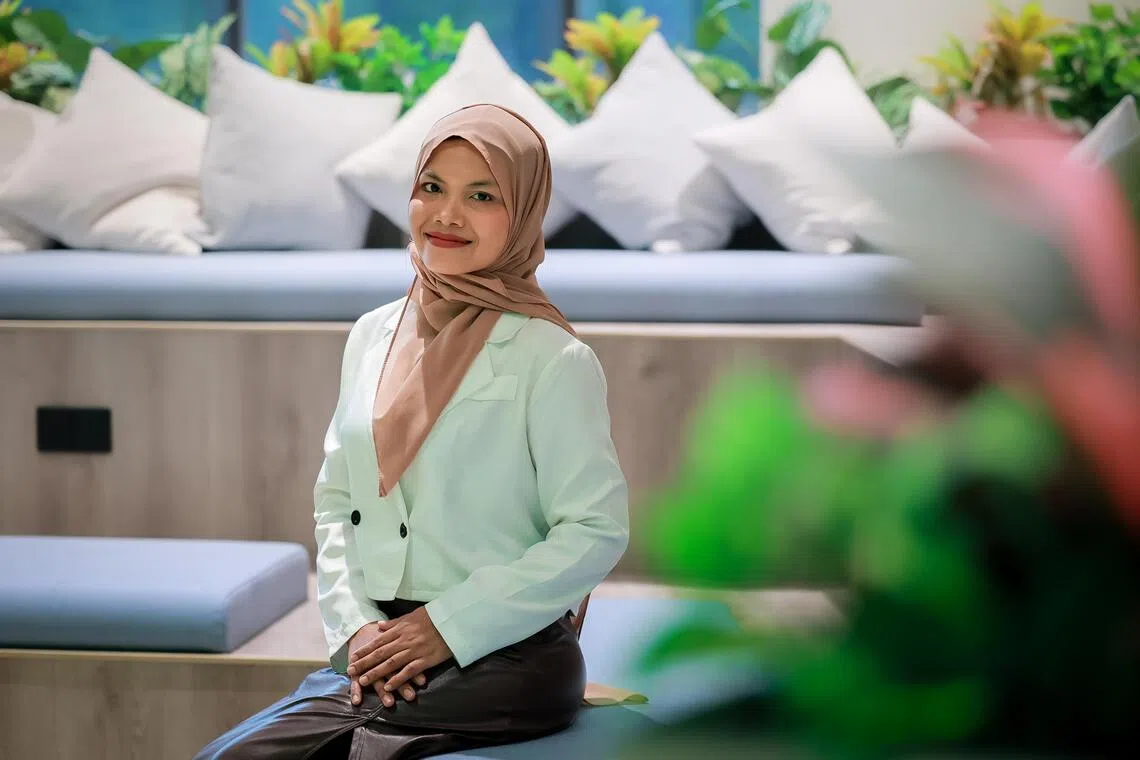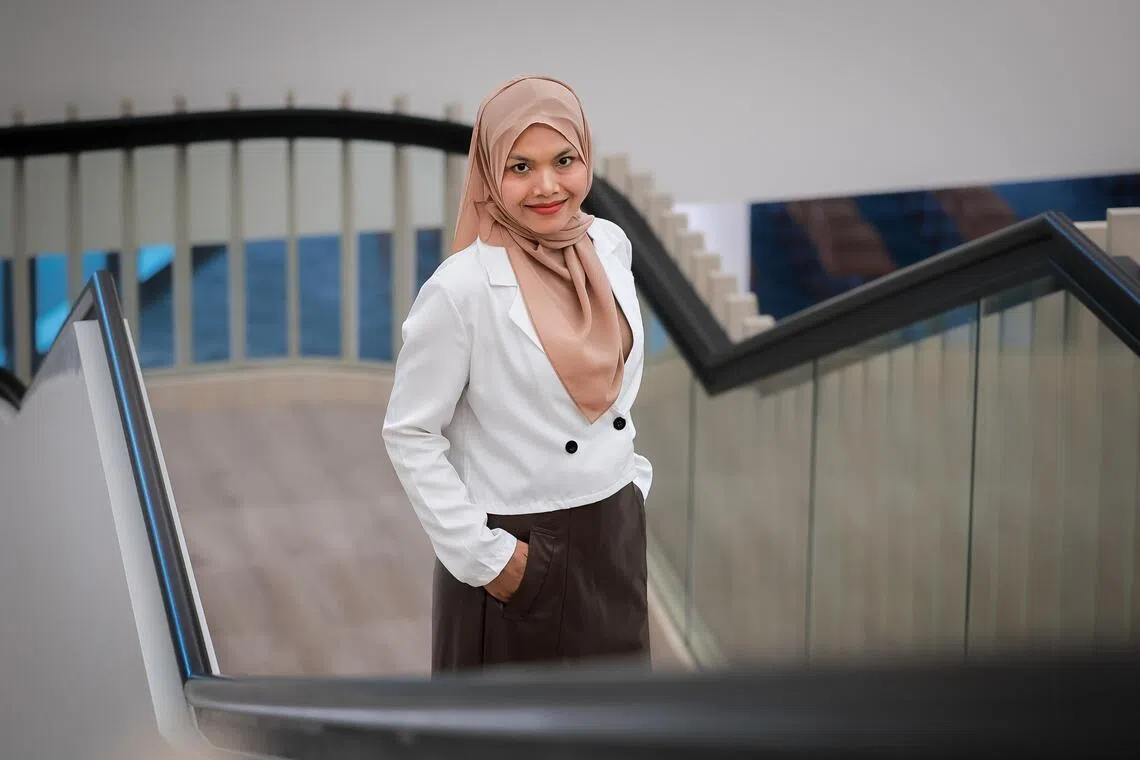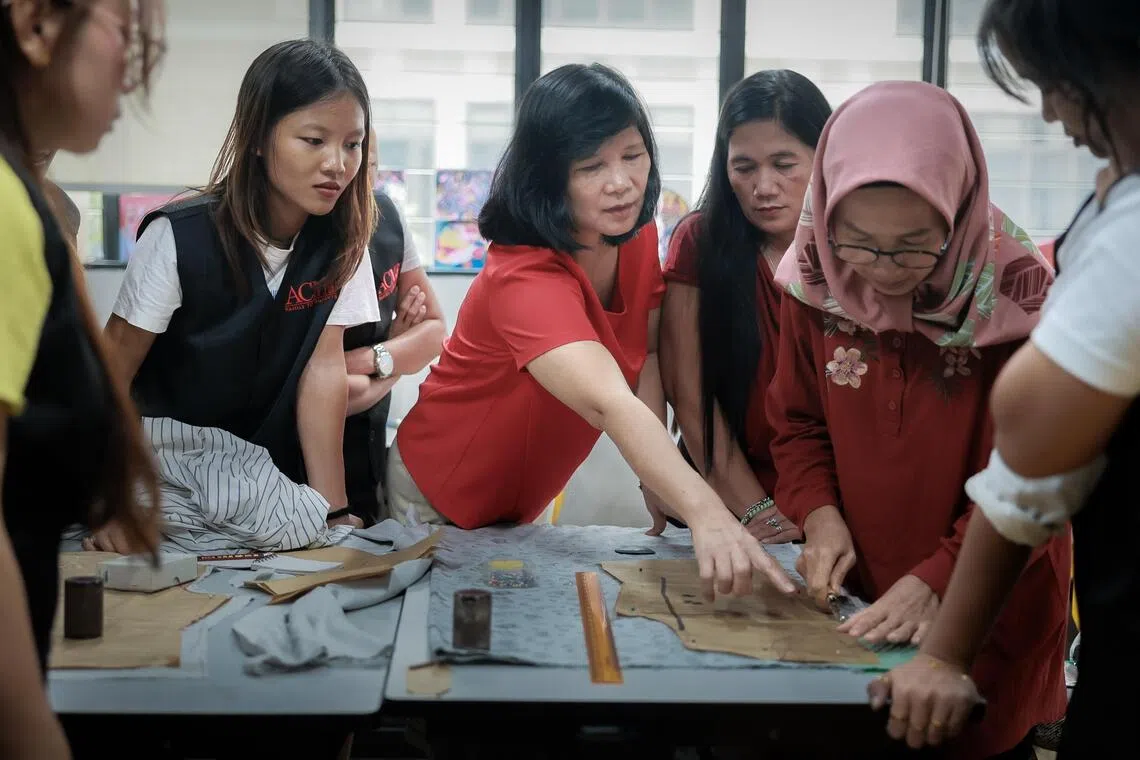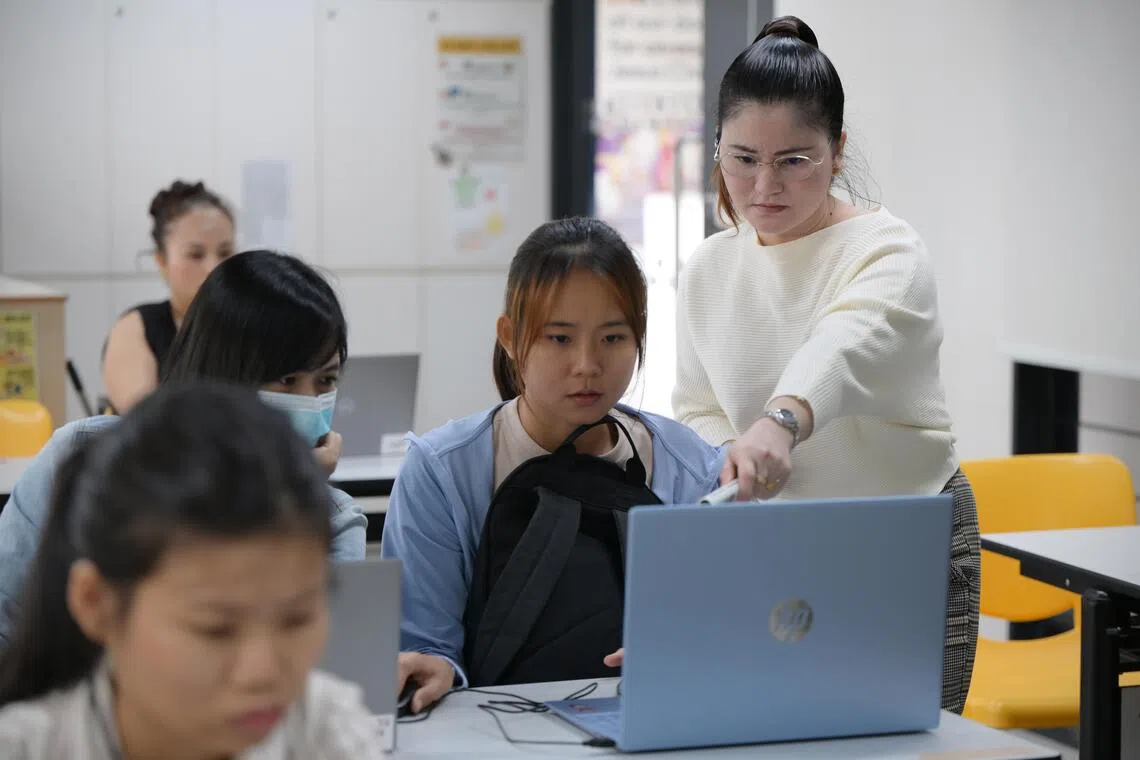We can rewrite our stories: Indonesian maid who earned online degree while working in Singapore
Sign up now: Get ST's newsletters delivered to your inbox

Ms Siti said most domestic helpers did not have a chance to discover their talents at a young age, and wants to encourage them to pursue their dreams.
ST PHOTO: GAVIN FOO
- Siti Mujiati, a domestic helper, achieved her dream of higher education by earning an English literature degree through online classes.
- Charities like Aidha, ACMI and Home offer courses to domestic helpers, providing skills like cooking, dressmaking, computer literacy and entrepreneurship.
- Domestic helpers gain confidence, skills, and opportunities through these courses, with some pursuing better jobs or businesses back home.
AI generated
SINGAPORE - Growing up in an Indonesian village where most girls did not pursue higher education, Ms Siti Mujiati nevertheless dreamt of being an educator.
She put that aside when she came to Singapore in 2012 to work as a domestic helper, to raise her two daughters as a single mother.
Years later, while attending financial management courses at Aidha, an independent charity founded in 2006, Ms Siti – who is now 40 – felt inspired to plan for her future again.
She saved up and put herself through three years of online classes. In 2021, she attained a bachelor’s degree in English literature from the Indonesia Open University, or Universitas Terbuka.
The Indonesian is one of thousands of domestic helpers here pursuing new skills via courses offered by non-governmental organisations and charities.

Ms Siti Mujiati, an Indonesian domestic helper, earned a bachelor’s degree in English literature after saving up and attending online classes over three years.
ST PHOTO: GAVIN FOO
About 2,000 domestic helpers and low-income women attend Aidha’s courses annually, with participation increasing by 25 per cent in the last three years.
Another charity, the Archdiocesan Commission for the Pastoral Care of Migrants and Itinerant People (ACMI) – a member of Caritas, the official social and community arm of the Catholic Church in Singapore – sees up to 600 students a year, and student numbers are increasing.
These charities offer courses ranging from cooking and caregiving to playing the guitar, entrepreneurship and computer literacy. They said domestic workers join such courses to feel empowered and to build a better future.
Ms Siti said: “Earning my university degree felt like reclaiming a dream I buried long ago.”
Passion pursuit
Every year, about 1,000 helpers graduate from 14 courses offered by the Humanitarian Organisation for Migration Economics (Home).
Home’s deputy director, Mr Prashant Somosundram, said some helpers learn hairdressing and dressmaking to start businesses back home.
He added: “Some graduates (of healthcare-related courses) have transitioned to higher-paying positions in healthcare settings such as nursing homes and hospices.”
Ms Siti said most domestic helpers did not have a chance to discover their talents when they were younger.
She said: “Many are not confident in their work as domestic helpers, but we are actually smart (because) we have to do everything in the home.”
After Aidha’s financial management course in 2018, she saved about $1,700 for her university education.
She studied on public transport and until midnight daily after completing her chores. The next day, she would get up at 6am to work. Her then employer gave her a laptop for her studies.
Madam Juliet Paragas, 52, who has worked for the same family here for almost 30 years, had her employer’s blessings to join a dressmaking class at ACMI in 2017. Her employer even bought her some fabric.
Madam Paragas purchased a $175 sewing machine and made pyjamas for her children at night.
She said: “I was very happy I could finally make my own clothes and design them too.”
Now, she conducts monthly basic and advanced dressmaking classes for domestic workers at social services hub Agape Village, which is run by Caritas, in Lorong 8 Toa Payoh.
Beaming, she said: “Sometimes when we meet outside, they call me teacher!”

Madam Paragas conducts basic and advanced dressmaking classes for other domestic workers every month at Agape Village in Toa Payoh.
ST PHOTO: GAVIN FOO
From students to trainers
Most of these organisations charge subsidised course fees of between $100 and $400, paid by the helpers or their employers.
Aidha said many employers pay the $150 fees for its courses as they believe the courses will help their workers grow in confidence.
The National Trades Union Congress’ Centre for Domestic Employees (CDE), which has seen more than 1,800 domestic workers joining its programmes since 2024, offers free or subsidised courses.
CDE’s new Hokkien and Cantonese classes,
Some domestic workers are now teaching other helpers.
Ms Mabelle Borja, 41, who has a degree in computer science from the Philippines, volunteers twice a month at ACMI teaching computer skills and web design.
When The Straits Times was at one lesson in July, the petite Filipina weaved around a class of eight helpers as she taught them to create an online retail store.

Ms Borja guiding a class of domestic workers to create an online retail store. The class is hosted by ACMI at Agape Village in Toa Payoh.
ST PHOTO: NG SOR LUAN
Ms Borja said some helpers do not even know what a computer mouse is, but after her class, they say: “At least I am not scared to touch this any more.”
Some of her students have started online businesses back home. Ms Borja, a former secretary, wants to design children’s books in the future.
Ms Siti has since started a Facebook group to study English with other domestic workers, and contributes stories about her fellow helpers as a volunteer for an Indonesian media outlet.
She said: “I hope it inspires others to believe that working in Singapore doesn’t mean giving up on education. We can rise, study and rewrite our stories.”



